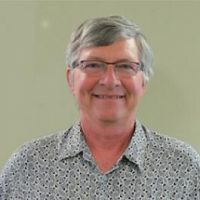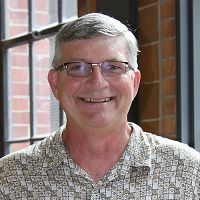IML-CZO Investigator Profiles: Art Bettis (University of Iowa)
Iowa poet laureate Mary Swander once said that the Hawkeye State has “the most altered landscape in the United States.”
This alteration is largely due to agriculture – the state’s number one industry – with approximately 92 percent of land in Iowa devoted to crops. Prior to European settlement in the 19th century, approximately 70 percent of Iowa land was covered in prairie and 19 percent was forest.
This massive transformation of the landscape of Iowa and other Midwestern states is a large part of what is being studied by IML-CZO investigators such as Dr. Art Bettis. Dr. Bettis –professor of Earth and Environmental Sciences at the University of Iowa –largely focuses on soils and geologic deposits with his involvement in the IML-CZO.
“Soils and geologic deposits are the earth’s dynamic processors and recyclers of materials and energy,” said Dr. Bettis. “Daniel Hillel, a prominent soil physicist aptly refers to soil as, ‘the seminal crucible within which life in the land domain is generated and sustained.’ As such all Critical Zone processes are influenced by soils and the geologic deposits soils are formed in.”
Dr. Bettis’s specialization with soils and geologic deposits is part of the CZO’s emphasis on interdisciplinary collaboration. Much like in sports, CZO researchers must work as a team to achieve an overall goal.
“If there is one overarching concept that scientists and engineers have mutually agreed upon over the past few decades it is that individual processes act within larger systems. Working as an interdisciplinary team really helps individual ‘experts’ understand their focus in the context of the system as a whole. This leads to formulation of important questions that wouldn’t happen without the system perspective. These kind of new questions – outside the box of traditional disciplines – drive discovery.”
Dr. Bettis has more than four decades of experience studying soil and geology. The Sioux City, Iowa-native earned a B.S. in anthropology in 1975 and a M.S. in agronomy in 1979, both from Iowa State University. After graduation, Dr. Bettis worked as a geologist with the Iowa Geological Survey in Iowa City for almost two decades while pursuing a PhD in geology at the University of Iowa.
Having spent most of his life in Iowa, Dr. Bettis has seen firsthand the impact that agriculture has had on his state’s landscape and how the threat of climate change will contribute to the challenges facing farmers, researchers, policymakers, and others living in the Midwest.
“Climate change is one part of the system of environmental change that has and continues to significantly impact soils and the rest of the critical zone in the Midwest. Much of our past and current land use is unsustainable with regard to soils’ ability to perform life-sustaining ecological functions. Soil organic matter has been significantly reduced by erosion and oxidation fostered by tillage and the warming climate only exasperates these processes.”
Despite the challenges facing Midwestern land, researchers are trying hard to be on the front-end of combating the effects of climate change. Farmers are encouraged to practice measures that when properly implemented not only preserve soil health but can provide other environmental benefits such as improved water quality. Agricultural pollution has not only damaged waterways in the Midwest but it has also contributed to the ecological “dead zone” in the Gulf of Mexico which is now the size of Connecticut and Rhode Island combined.
“Recent efforts to reverse this trend through use of cover crops, no-till and alternative crops such as grass-based biofuels are steps in the right direction. We need to treat soil like a bank account. Continual overdrafts for the past century and a half in the form of soil erosion, organic matter and nutrient losses will require large and continual deposits of conservation measures for a long time to restore many of the ecological functions of our soils to a healthy state.”
By Nick Fetty (Journalism, University of Iowa)
This is part of a series of articles featuring investigators involved in the IML-CZO project.
Explore Further




